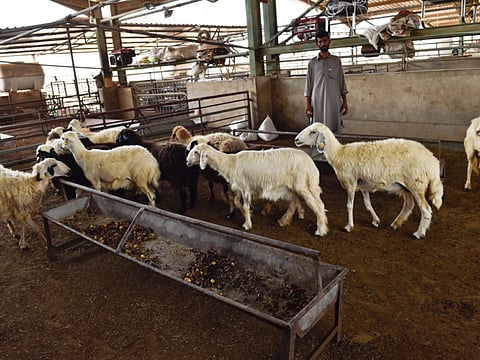Abu Dhabi to vaccinate more than 2.1 million animals
Initiative to immunise cows, goats and sheep against a triad of animal diseases

Abu Dhabi: Abu Dhabi is set to vaccination 2.1 million animals as part of its 14th annual livestock vaccination campaign, the Abu Dhabi Agriculture and Food Safety Authority (Adafsa) has announced.
Extending from August 28 to May 31, 2023, the campaign will target diseases affecting livestock, and enhance the emirate’s biosecurity system by improving animal immunity and eradicating epidemic diseases. The initiative will mainly control three diseases, including peste des petits ruminants (PPR), foot-and-mouth disease (FMD), and crystalline inflammation.
Stages of campaign
The vaccination campaign will consist of three stages. In the first, animals will be vaccinated against PPR alone, while the second and third stages will vaccinated livestock against FMD and crystalline inflammation.
According to the Adafsa, a total of 2,182,870 animals cows, goats, and sheep will be immunised against FMD, and 943,398 goats will be vaccinated against crystalline inflammation. Sheep and goats will be vaccinated against PPR as needed.
Regular campaignThe Adafsa’s regular vaccination campaigns aim to prevent the outbreak of epidemic diseases and boost livestock immunity. It also contributes to reducing the use of veterinary medicines and eradicating diseases in the long term, thereby developing the livestock sector and increasing economic returns for livestock breeders.
How to access
The Adafsa urged livestock breeders to collaborate with vaccination teams and follow guidelines during the campaign. Breeders can contact the nearest veterinary clinic to schedule a visit in order to kickstart the process, and prepare animals.
Intensified efforts
Over the last two years, the Adafsa has intensified its efforts to control and mitigate the spread of livestock diseases, especially as the COVID-19 pandemic placed renewed focus on the transfer of zoonotic diseases to human populations. The authority, which also runs laboratories accredited by the World Organisation for Animal Health to investigate and trace camel disease, also organised the 37th World Veterinary Association Congress in the capital earlier this year. The three-day meet brought together health experts, officials, and researchers to discuss animal and human safety.



